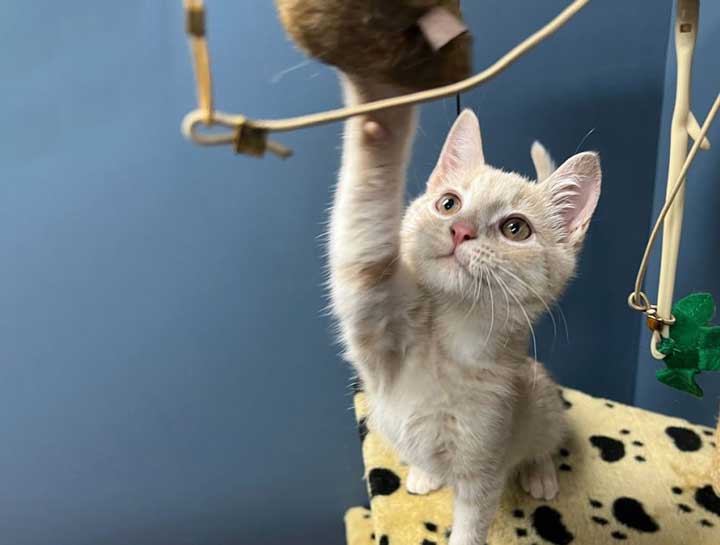Preventive Care for Cats
Help your cat live a longer, happier life.
Preventive care is an essential part of keeping your cat happy and healthy. It will give you peace of mind and increase the odds of detecting underlying health conditions before they become advanced and expensive.
How often should my cat see a veterinarian?
At Burlington Veterinary Center, we make our preventive care recommendations using the guidelines established by the American Veterinary Medical Association (AVMA) and the American Animal Hospital Association (AAHA). From there, our veterinarians further customize their suggestions based on hereditary factors including your cat’s age, lifestyle, and medical history.
Typically, we suggest scheduling at least one annual exam during which one of our veterinarians will review your cat’s medical history, assess their behavior, make dietary recommendations, and evaluate any known health conditions they may have.
Vaccinations
In the past, there have been many different vaccination recommendations for dogs and cats in the United States that have been based on the best available scientific information. For many years annual revaccination was considered the appropriate standard practice. However, in recent years there has been mounting evidence that annual revaccination of pets with certain vaccines is not only unnecessary but in rare cases, potentially harmful. The introduction of better vaccines and recent duration of immunity studies suggest that certain vaccines may provide more lasting immunity than previously appreciated. Leaders in the veterinary community believe the appropriateness of various vaccinations and the interval of administration are best assessed in conjunction with a complete physical examination and health evaluation.
Here at the Burlington Veterinary Center, we believe the health status of the individual pet and the pet’s infectious disease risks should dictate the appropriate vaccine selection. In light of the latest evidence that annual revaccination for certain pathogens is no longer scientifically justified and our desire to avoid adverse vaccine-associated events.
Core Vaccines
- Feline Panleukopenia
- Rhinotracheitis
- Calici virus (combination modified-live or killed vaccine)
- Rabies virus (killed vaccine)
Recommended vaccination interval: Administered at 3-4 week intervals until the kitten is 12 weeks of age then boostered one year later, then administered every 3 years thereafter. This vaccine is highly recommended for all cats. Administer only the killed vaccine to pregnant queens or immunocompromised patients.
Rabies - Recommended vaccination interval: Administered at 12+ weeks of age and then annually thereafter. Current rabies vaccination is required by state law.
Non-Core Vaccines
- Feline Leukemia virus (recombinant vaccine)
Recommended vaccination interval: Administered at 8+ weeks of age and repeated 3 weeks later. Regarding our Feline friends recent studies have demonstrated that adult cats over 4 years of age with previous Feline Leukemia vaccination have sufficiently enhanced immunity against Feline Leukemia virus and no longer warrant annual revaccination. The BVC has elected to decrease the frequency of administration of Feline Leukemia vaccines after age 4 to once every 3 years in those cats at risk of exposure to Feline Leukemia (i.e. outdoor cats or cats visiting/interacting with other outdoor or other at-risk cats).
At your cat's annual exam, your veterinarian will answer any questions you may have and discuss other services that could improve their overall health such as spaying/neutering, microchipping, and dental care.
Call us at (860) 675-6009 or request an appointment online to schedule your cat's annual preventive care exam.

